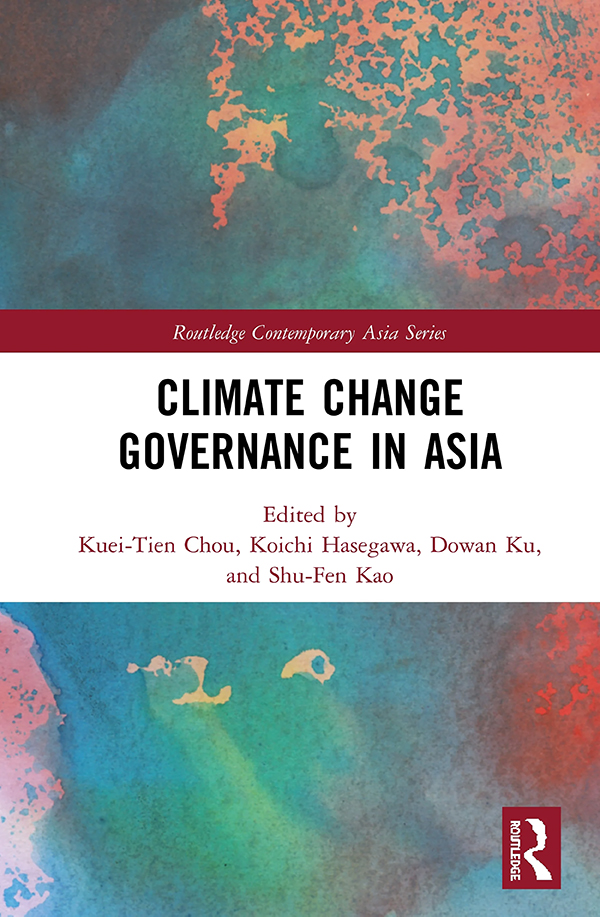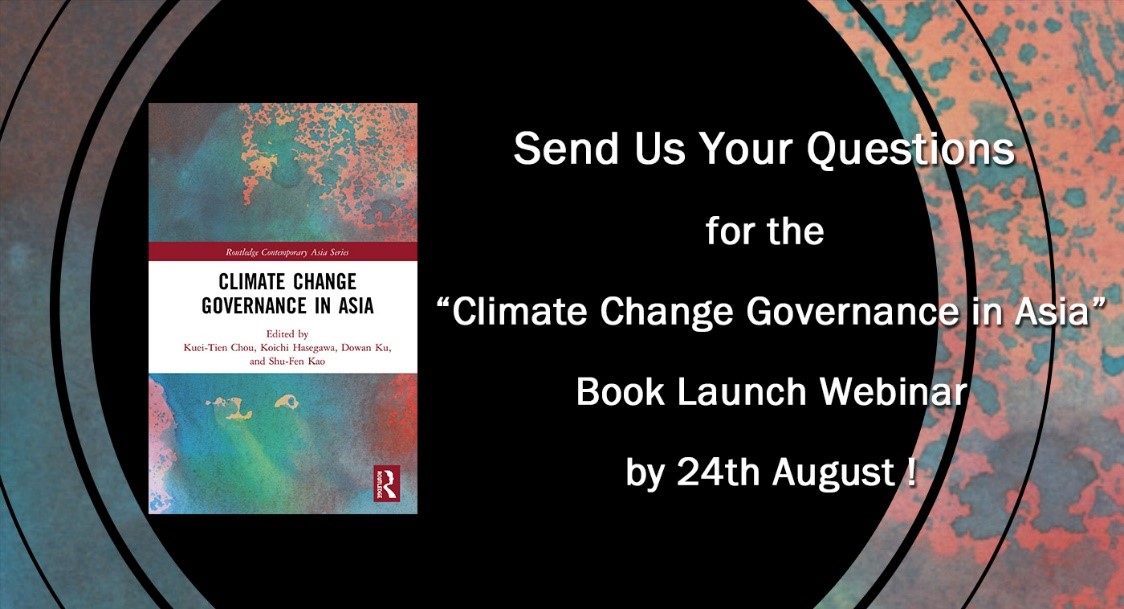
Climate Change Governance in Asia
Editor:Kuei-Tien Chou, Koichi Hasegawa, Dowan Ku, Shu-Fen Kao
Contributors:Leah Abayao, Midori Aoyagi, Chia-Wei Chao, Kang Chen, Roger S. Chen, Kuei-Tien Chou, Koichi Hasegawa, Shu-Fen Kao, Hajime Kimura, Dowan Ku, Ho-Ching Lee, Seejae Lee, So-Young Lee, Hwa Meei Liou, Alex Y. Lo, Anshu Ogra, Chaya Vaddhanaphuti, Sun-Jin Yun, Eric Zusman
Asian countries are among the largest contributors to climate change. China, India, Japan and South Korea are among the top ten largest carbon emitters in the world, with South Korea, Japan and Taiwan also some of the largest on a per capita basis. At the same time, many Asian countries, notably India, Taiwan, Japan, the Philippines and Thailand are among those most affected by climate change, in terms of economic losses attributed to climate-related disasters.
相關連結:
【Book Launch Webinar】Climate Change Governance in Asia
- Book Launch Webinar
- Editors
- Contributors
- Contents
- Send Us Your Questions
Asian countries are among the largest contributors to climate change. China, India, Japan and South Korea are among the top ten largest carbon emitters in the world, with South Korea, Japan and Taiwan also some of the largest on a per capita basis. At the same time, many Asian countries, notably India, Taiwan, Japan, the Philippines and Thailand are among those most affected by climate change, in terms of economic losses attributed to climate-related disasters.
Asia is an extremely diverse region, in terms of the political regimes of its constituent countries, and of their level of development and the nature of their civil societies. As such, its countries are producing a wide range of governance approaches to climate change. Covering the diversity of climate change governance in Asia, this book presents cosmopolitan governance from the perspective of urban and rural communities, local and central governments, state-society relations and international relations. In doing so it offers both a valuable overview of individual Asian countries’ approaches to climate change governance, and a series of case studies for finding solutions to climate change challenges.
Kuei-Tien Chou is Professor at the Graduate Institute of National Development, National Taiwan University and Lead Principal Investigator of Risk Society and Policy Research Center, National Taiwan University.
Koichi Hasegawa is Professor of Sociology at Graduate School of Arts and Letters, Tohoku University, Japan.
Dowan Ku is Director of Environment and Society Research Institute, Seoul, South Korea.
Shu-Fen Kao is Associate Professor at the Department of Sociology, Fo Guang University, Taiwan.
Leah Abayao is Professor of History and former Director of Cordillera Studies Center at the University of the Philippines, Baguio.
Midori Aoyagi is Principle Researcher at the Center for Social & Environmental Systems Research, National Institute for Environmental Studies, Japan.
Chia-Wei Chao is Postdoctoral Fellow at the Risk Society and Policy Research Center, College of Social Science, National Taiwan University.
Kang Chen is PhD graduate of the Department of Geography, the University of Hong Kong.
Roger S. Chen is Associate Professor at the Graduate Institute of Construction Engineering and Management, National Central University, Taiwan.
Kuei-Tien Chou is Professor at the Graduate Institute of National Development, National Taiwan University and Lead Principal Investigator of Risk Society and Policy Research Center, National Taiwan University.
Koichi Hasegawa is Professor of Sociology at the Graduate School of Arts and Letters, Tohoku University, Japan.
Shu-Fen Kao is Associate Professor at the Department of Sociology and Social Work, Fo Guang University, Taiwan.
Hajime Kimura already has a PhD in Science, Waseda University in Tokyo, and now he is studying for his PhD in Sociology, Meiji University, Japan.
Dowan Ku is Director of the Environment and Society Research Institute,
Seoul, South Korea.
Ho-Ching Lee is Professor at the Center for General Education, National Central University. Taiwan
Seejae Lee is Professor Emeritus at the Catholic University of Korea.
So-Young Lee is Senior Policy Researcher and Research Manager at the Sustainability Governance Centre, Institute for Global Environmental Strategies, Japan.
Hwa Meei Liou is Professor at the Graduate Institute of Technology Management, National Taiwan University of Science & Technology.
Alex Y. Lo is Senior Lecturer in Climate Change at the School of Geography, Environment and Earth Sciences, Victoria University of Wellington, New Zealand.
Anshu Ogra is a Post-Doctoral Research Associate in the Landslip Project at the Department of Geography, King’s College London.
Chaya Vaddhanaphuti is Lecturer in the Department of Geography, Faculty of Social Sciences, Chiang Mai University, Thailand.
Sun-Jin Yun is Professor of Environmental and Energy Policy at the Graduate School of Environmental Studies, Seoul National University.
Eric Zusman is Senior Policy Researcher/Area Leader at the Institute for Global Environmental Strategies, Japan.
- Introduction
Part I. Framework of Climate Change Governance in Asian Countries
- Koichi Hasegawa
Climate Change Governance in Japan: Critical Review on Japan's INDC and its Energy Policy
- Kuei-Tien Chou and Hwa Meei Liou
Climate Change Governance in Taiwan: The Transitional Gridlock by a High Carbon Regime
- Sun-Jin Yun
Climate Change Governance in Korea: Focusing on the Process of the Establishment of its NDC
- Kang Chen and Alex Y Lo
Climate Governance in China: the role of International Organisations in the Guangdong Emission Trading Scheme
Part II. Risks and Transition
- Chaya Vaddhanaphuti
Governing Climate Knowledges: what can Thailand Climate Change Master Plan and climate project managers learn from lay Northern Thai villagers?
- Midori Aoyagi
Risk Perceptions and Attitudes Toward National Energy Choices and Climate Change in Japan and European Countries
- Chia-Wei Chao and Kuei-Tien Chou
Governing the Climate-Driven Systemic Risk in Taiwan – Challenges and Perspectives
- Hajime Kimura
Ecological Modernization, New Technologies and Framing in the Environmental Movement: A climate Change Mitigation Technology (CO2 capture and storage) and its Environmental Risk
Part III. Local Governance on Climate Change Adaptation
- So-Young Lee, Eric Zusman and Seejae Lee
Tracing Sustainability Transitions in Seoul Governance: Enabling and Scaling Grassroots Innovations
- Anshu Ogra
Rethinking Adaptation to Climate Change in the Policy Landscape of India
- Leah Abayao
Disaster Risk Governance in Northern Philippines Communities: Issues and Prospects in Climate Change Talks
- Roger S. Chen and Ho-Ching Lee
Assessing Climate Governance of Tainan City through Stakeholder Networks and Text Mining

Introduction
We will be launching our new book, "Climate Change Governance in Asia". The book is edited by National Taiwan University's Kuei-Tien Chou, Tohoku University's Koichi Hasegawa, Seoul Environment and Society Research Institute's Dowan Ku and and Fo Guang University's Shu-Fen Kao, and published by Routledge. The book contributors will share their insights on the chapters they wrote and discuss questions from readers
We know that you have many questions about the book and about climate change governance in Asia. As such, we welcome you to submit your questions in this online form below by 24th August, and our authors will respond to them!
You will be able to watch the book launch on 8th September.
Please also leave us your email via the form below, if you would like us to send you the link for the webinar when it is up! You will also receive a special code to get a 30% discount off the book if you fill up the form below!
Please watch the webinar video in our Youtube channel
【Book Launch Webinar】Climate Change Governance in Asia
Organizers
Risk Society and Policy Research Center (RSPRC), National Taiwan University (NTU)
Speakers
Prof. Kuei-Tien Chou (Editor, Co-author of Chapter 1, Chapter 3 and Chapter 8)
Director of the RSPRC, and Professor at the Graduate Institute of National Development, National Taiwan University.
Prof. Koichi Hasegawa (Editor, Author of Chapter 2)
Professor of Sociology at Graduate School of Arts and Letters, Tohoku University, Japan.
Dr. Dowan Ku (Editor. Co-author of Chapter 1)
Director of Environment and Society Research Institute, Seoul, South Korea.
Prof. Shu-Fen Kao (Editor)
Associate Professor at the Department of Sociology, Fo Guang University, Taiwan.
Dr. Chaya Vaddhanaphuti (Author of Chapter 6)
Lecturer in the Department of Geography, Faculty of Social Sciences, Chiang Mai University, Thailand.
Dr. Midori Aoyagi (Author of Chapter 7)
Principle Researcher of Center for Social & Environmental Systems Research, National Institute for Environmental Studies, Japan.
Dr. Chia-Wei Chao (Author of Chapter 8)
Postdoctoral Fellow at the Risk Society and Policy Research Center, College of Social Science, National Taiwan University.
Dr. Anshu Ogra (Author of Chapter 11)
Post-Doctoral Research Associate in the Landslip Project at the Department of Geography, King's College London.
Prof. Leah Abayao (Author of Chapter 12)
Professor of History and former Director of Cordillera Studies Center at the University of the Philippines, Baguio.
Prof. Ho-Ching Lee (Author of Chapter 13)
Professor at the Center for General Education, National Central University. Taiwan.
Moderators
Prof. Kuei-Tien Chou
Director of the RSPRC, and Professor at the Graduate Institute of National Development, National Taiwan University.
Please find the book details in the other webpage, or see the quick extract below.
Covering the diversity of climate change governance in Asia, this book presents cosmopolitan governance from the perspective of urban and rural communities, local and central governments, state-society relations and international relations. In doing so it offers both a valuable overview of individual Asian countries' approaches to climate change governance, and a series of case studies for finding solutions to climate change challenges. —from the description of "Climate Change Governance in Asia" by Routledge
We start the discussion in this book by seeking to understand how people and governments in Asia address climate change, for instance whether it is being treated as a global, national, or local agenda, or whether it is seen as a scientific agenda, or an issue that touches on everyday life. We also look at the types of governances that have been constructed in Asia in order to tackle climate change. However, it is hard to find successful climate change governance in Asia because many Asian countries are trapped in the high-carbon economy model. Green politics on the basis of strong liberal democracy has not developed in Asia. Instead, the developmentalism model based on nationalism is a common characteristic in Asian countries. Nonetheless, environmentalists and local populations in Asia concerned about climate change have made a great effort to overcome climate change, and they have been working at the local, national, and global scales. It is also important to understand that the issue of climate change is constructed by various social forces. Social groups work together or fight each other over how climate change should be addressed. Climate change issues also cut across the traditional regime of governance.
However, new sustainability transition governance in which strong ecological modernization is successful can be constructed, if strong social solidarity movements for sustainability are sufficiently powerful. As it is, the cosmopolitan mindset has gained traction among peoples in Asia, though cosmopolitan governments have not yet taken root. In this book, we will therefore analyze how climate change governance in Asia is constructed and how it works on the national and local scales. Ultimately, climate change governance in Asia can be successfully constructed and implemented if governments are willing to work together not only with the business sector but also with civil society. In fact, there are already people in different parts of Asia who have mobilized themselves toward trying to achieve a sustainable society, thus the question is how we can take it to the next level. —from the Introduction of "Climate Change Governance in Asia" by Kuei Tien Chou and Dowan Ku

This work is licensed under a Creative Commons Attribution-NonCommercial-NoDerivatives 4.0 International License.
※The aforementioned may not be copied for commercial use without the center's consent, thank you.※
